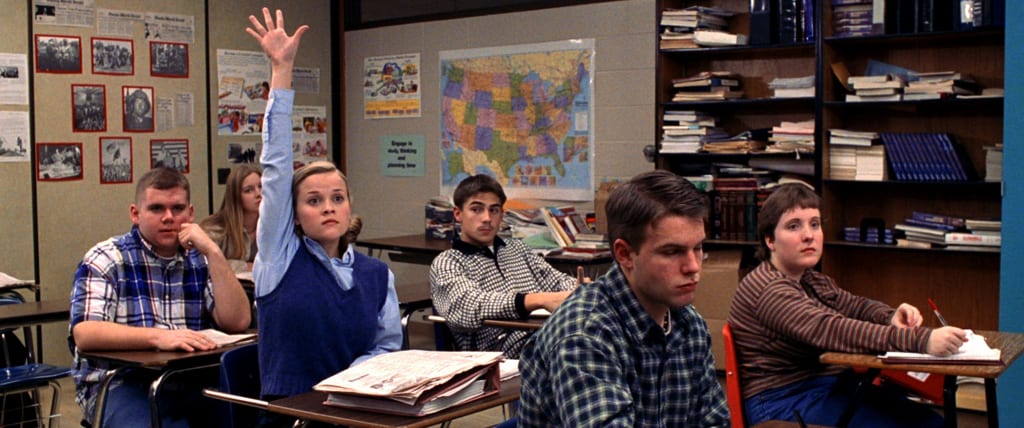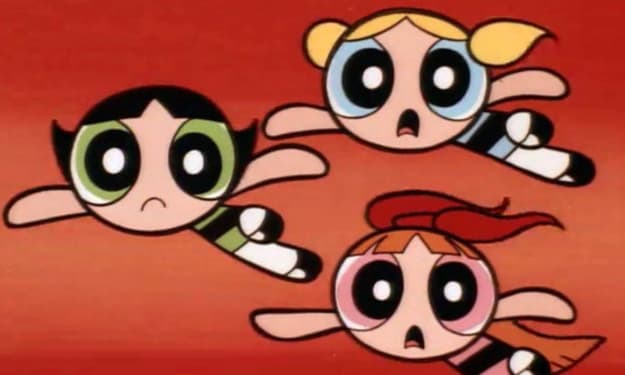Ethics, Morals, and Hypocrisy
How Election Serves as the Epitome of Smart Cinema

Turning away from the destiny-driven, hyper theatrical blockbusters of the 1980s, independent films of the 1990s established a cinematic rebellion that seemed to reflect the cultural shifts of the decade. Thus, Smart Cinema was born.
“Relying heavily on irony, black humor, fatalism, relativism, and occasional nihilism, this cinema became a particularly active battleground in a larger moral debate over the place of cynicism, irony, postmodernism, secular humanism, and cultural relativism in contemporary popular culture” according to Linda Ruth Williams in the book Contemporary American Cinema.
Filmmakers born during the auteurist “Art film" renaissance of the 60s and 70s reemerged a self-aware, pessimistic subgenre inspired by these films and the historic letdowns of America’s past as they so recognized.
Shedding obvious commentary on the US primary elections of 1999, Alexander Payne’s film Election tells a tight-knitted story about the sad, ironic life of a high school History teacher, Mr. McAllister. Though he spends year after year explaining the use of ethics and morals to his fellow students, McAllister struggles with how to rightfully apply these concepts within his own life, while simultaneously trying to teach the same lessons to one particularly overly-ambitious student of his, Tracy Flick.
Election clearly reflects the notion of Smart Cinema with its expressionistic use of mise-en-scéne and blank style of narration, giving light to the newfound justification of wrongdoings, and examination of the unexplored ‘grey areas’ of right and wrong.
The blank style in narration heard in Election directly reflects the pessimistic, realist ideas of Smart Cinema. The entire film is tremendously littered with narration, which is used in a way that drives the plot by bringing the narrative agents together even though their viewpoints and ideas widely disagree with one another.
This type of dialogue allows for the film to reveal its own sarcasm in a way that depicts some sort of unspoken lesson or commentary that allows justification to the actions of each character. Right and wrong are muddled into a grey puddle of indifference in this film, showing the audience that life will always be more complicated than just ethics and morals.
The school election candidates, Tracy, Paul, and Tammy all explain their reasons for their actions. Through their actions aren’t necessarily the best decisions to make within the film’s situation, their narrations give light to the justifications these characters make, and the audience root for certain characters' successes, even though these characters may not deserve what they desire. For instance, Mr. McAllister wrongfully tries to stop Tracy Flick from winning the school election by convincing another student, Paul, to run against her. As an educator, McAllister feels he has a right to teach Tracy that it is ethically wrong to always be power-hungry and to tear people down in order to get to the top. Meanwhile, he himself is wrongfully pursuing an affair that could end his lackluster marriage.
Nonetheless, we root for McAllister, even though we understand he is also morally wrong because we are able to understand his justifications through narration. In the scene where McAllister sees Tracy spying on the tallie votes for the election, he explains why he sabotaged her chances through narration, “The sight of Tracy at that moment affected me in a way I can't fully explain. Part of it was that she was spying, but mostly it was her face. Who knew how high she would climb in life? How many people would suffer because of her? I had to stop her, now”.
The audience sees and understands his reasons for the sabotage, but simultaneously sees the errors in his decisions by ruining his marriage due to rash decisions made like sleeping with his wife’s divorced friend. This creates a cognitive dissonance to the audience. Is Mr. McAllister right or wrong? Which is the exact cynicism reflected in the subgenre of Smart Cinema.
Expressionistic use of mise-en-scéne cinematography is seen in Election through color, props, and the usage of shots. Though the narrations already shed enough light on the justification of these characters' actions, the mise-en-scéne and cinematography add another thick layer of muddled ethics and morals.
The colors in this film are mostly vibrant and eye-catching, but in certain scenes, color is highly saturated to further show the emotions that these characters feel. For instance, in the scene when McAllister is about to cheat on his wife with Linda, The colors in the frame are extremely saturated. The pink color of Linda’s bathroom is pinker than in other scenes, showing the audience that passion has heightened even before these characters make any moves on each other. This scene uses pink instead of red to indicate passion which is particularly interesting in relation to Mr. McAllister because it awakens the notion of a more domesticated, familial passion than anything just sexual.
In the film, McAllister had been trying to have a baby with his wife, but it hasn’t been going well; no baby and no passion. During the infidelity, the shot pans down to show Linda’s baby sitting in the crib in the foreground, when the acts of sex by Linda and McAllister are happening in the middle ground. This expressionism shows the visual justification of Mr. McAllister’s mind and reveals that though he knows he is morally wrong, what he’s doing feels right to him at that time.
We also see this notion in the cinematography used during Tammy’s narrational explanations in the film, “It's not like I'm a lesbian or anything. I'm attracted to the person. It's just that all the people I've been attracted to happen to be girls”. Tammy’s sexuality not only adds to the moral attitudes of what’s right and what’s wrong in 1990’s society, but the cinematography used in her sequences greatly shows the audience her specific justifications in action. Tammy is Paul’s sister, and she runs for school president only because her friend, whom she’s in love with, decides she is not lesbian and starts dating Paul in spite of Tammy. Tammy’s scenes depict her happiness when she’s in love by the split-screen cinematography, slow motion editing, and old-timey music which shows the audience her justification in why she is running in the school election.
Going back to the use of mise-en-scene, the props in Election are important, specifically paying attention to trash. Trash is a ubiquitous, unspoken theme in this film. Trash follows McAllister throughout the entire film, especially when he makes the poorest of decisions. Same with Tracy Flick.
Trash is even incorporated into the plot. For instance, when Mr. McAllister decides to sabotage Tracy’s chances of winning, he tries to make two votes disappear by throwing them in the trash. In another scene, when Tracy loses her cool and rips apart Paul’s election posters, she disguises her bad deed by throwing the ripped posters in the garbage, as if it wasn’t her who did it.
Shots of trash are seen so much in Election, which makes it difficult to ignore the political statement that director, Alexander Payne, is making; due to our poor decisions and selfish, justified thinking, each and every one of us are all garbage. Until we as a generation, or as a nation start to care for others, we will always result in revealing ourselves to be nothing more than stinky, rancid trash. A sarcastic, ironic approach to life seen through film; Smart Cinema at it’s finest.
In Conclusion, the blank, political satire film, Election, serves as the epitome of Smart Cinema, a culturally ironic, dry-humored, subplot inspired by Art films of the 1960s and early '70s.
The film uses a blank style of narration to deeply justify all of the characters morally wrong actions. The film also uses elements of mise-en-scene, cinematography, and editing to further establish the justifications of these characters.
The overall theme to take away from Election is that nothing in life is black or white. Right and wrong exist, solely in the context of life to give us humans a framework to live by, and though it is a sad truth, we as humans may try our hardest to be good people, but our decisions often give light to what we all really are; trash.
“It doesn’t seem too sensational to suggest that right now in this country we are being inundated with a cinema of hate, a cinema that encourages our sadism, our scorn and, worst of all, our total disinterest toward the world, other human beings, and just maybe ourselves”, says LA Weekly film critic Manohla Dargis.
Unless we see the error in our decisions and strive to create better lives for ourselves by being better people, even though those aren’t always decisions we want to make. Smart Cinema depicts the worst in us, by making us think about right and wrong in a forthright, seemingly uncomfortable way, Which is why many film critics have expressed their dislike for these films. Though we may not like the reflection that these films show us, we can definitely learn something from them.
Works Cited:
Williams, Linda Ruth, and Michael Hammond. Contemporary American Cinema, McGraw-Hill Education, 2006. ProQuest Ebook Central, http://ebookcentral.proquest.com/lib/ucsc/detail.action?docID=295533.
About the Creator
Mariah Mickens
linktr.ee/Mariah_Mickens






Comments
There are no comments for this story
Be the first to respond and start the conversation.